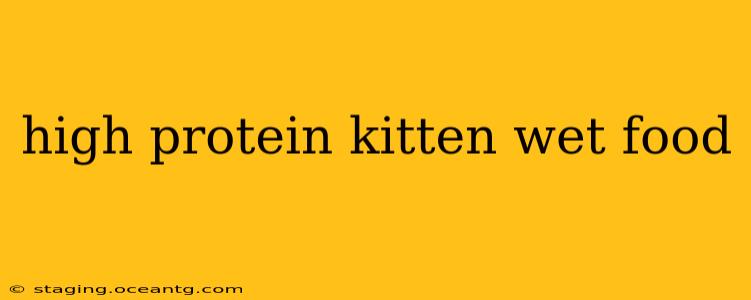Choosing the right food for your kitten is crucial for their healthy development. Protein is a cornerstone of a kitten's diet, fueling their rapid growth and supporting their developing muscles and organs. This guide delves into the world of high-protein kitten wet food, helping you select the best option for your furry friend.
What Makes High Protein Kitten Wet Food Important?
Kittens, unlike adult cats, have exceptionally high protein requirements. Their bodies are rapidly developing, demanding a significant protein intake to build and repair tissues, produce enzymes and hormones, and support overall growth. High-protein wet food offers a concentrated source of this essential nutrient, often exceeding the protein levels found in dry kitten food. The moisture content in wet food also aids in hydration, especially crucial for kittens prone to urinary tract issues.
How Much Protein Should My Kitten Get?
The exact protein requirements vary depending on your kitten's age, breed, activity level, and overall health. However, a general guideline suggests that kitten food should contain a minimum of 30% protein on a dry matter basis (DM). Always check the guaranteed analysis on the food label; this will give you the precise protein percentage. Remember to consult your veterinarian for personalized dietary advice, especially if your kitten has specific health concerns.
What to Look for in High-Protein Kitten Wet Food
Choosing the right high-protein wet food involves carefully examining the ingredient list and guaranteed analysis:
-
High-Quality Protein Sources: Look for named meat sources like chicken, turkey, salmon, or lamb as the primary ingredients. Avoid vague terms like "meat by-products" or "meat meal." These often contain lower-quality protein sources.
-
Animal-Based Proteins: Prioritize foods with a higher percentage of animal-based protein over plant-based protein sources. Kittens require specific amino acids found predominantly in animal proteins for optimal growth.
-
Low Carbohydrates: While some carbohydrates are necessary, kittens thrive on a diet relatively low in carbs. Excess carbs can lead to weight gain and other health problems.
-
Added Nutrients: Look for added taurine, an essential amino acid crucial for feline heart health, and other vital vitamins and minerals.
-
Appropriate Portion Sizes: Always follow the feeding guidelines on the packaging to avoid overfeeding, which can lead to obesity.
What are the Benefits of Wet Food over Dry Food for Kittens?
H2: Is Wet Food Better Than Dry Food for Kittens?
While both wet and dry food can be part of a balanced diet, wet food offers several advantages for kittens:
- Higher Moisture Content: Helps with hydration, particularly important for preventing urinary tract issues common in cats.
- Increased Palatability: Many kittens find wet food more appealing, especially during the transition from mother's milk.
- Higher Protein Density (Often): Many wet food formulations boast higher protein concentrations than dry kibble.
H2: Are There Any Potential Drawbacks to High-Protein Wet Food?
While generally beneficial, high-protein diets can have potential drawbacks if not managed properly:
- Potential for Obesity: Overfeeding, even high-protein food, can lead to weight gain. Always adhere to feeding guidelines.
- Kidney Stress (Rare): In rare cases, extremely high protein intake can potentially strain the kidneys, particularly in kittens with pre-existing conditions. Consult your vet if you have any concerns.
- Cost: High-quality, high-protein wet food can be more expensive than some lower-quality options.
H2: What are Some Good Brands of High-Protein Kitten Wet Food?
I cannot recommend specific brands as dietary needs vary greatly. Always check the ingredient list and guaranteed analysis before selecting a food, and consult your veterinarian to determine the best option for your kitten.
H2: How Do I Transition My Kitten to a New High-Protein Wet Food?
Introduce new food gradually over 7-10 days. Start by mixing a small amount of the new food with their current food, gradually increasing the proportion of the new food until they are eating it exclusively. This helps prevent digestive upset.
By carefully considering the factors outlined above, you can choose a high-protein wet food that will support your kitten's healthy growth and development, ensuring a happy and energetic feline companion. Remember, consulting your veterinarian is always the best way to ensure your kitten receives the nutrition they need.
